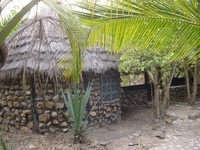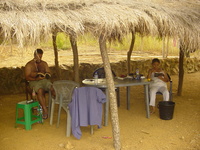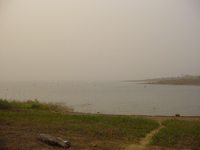Xofa Eco-Village (31 December – 2 January)
Up horribly early and then to Asafo station to take a bus to Accra. Lots of different “luxury” bus operators, so we chose one that had air conditioning and was already quite full. We bought tickets for ¢55,000 (£3) each and settled down for the journey.
We broke down on the outskirts of Kumasi but (unusually) the company had a spare bus and sent it to collect us. The new bus had condensation from the a/c dripping on the unfortunates in window seat but was better than nothing. We departed again at about 7am and arrived in Accra around 11.30.
After a cross-city taxi transfer we got to Tudu station and took a tro-tro going to Ho, asking the driver to drop us at Asikuma junction, ¢30,000. Once we got further north we could see that the Harmattan was fairly severe, with very poor visibility around Lake Volta.
At Asikuma junction we bargained with the taxi drivers but couldn’t get below ¢90,000 (£5, a day and a quarter’s VSO allowance) for a taxi to Xofa, they’re obviously too used to rich tourists. The driver whinged about the bad road all the way, although in Nigerian terms it was fairly average.
We arrived at Xofa Eco-Village (glowing article and criticism) and were immediately whisked to a covered area by the lake by the manager, Victus. The accommodation is in several little round houses, mostly in pairs and dotted around the site. They’re nice but constructed with more enthusiasm than skill, mosquito netting is mostly decorative as there are huge gaps left without nets.



The environment is beautiful and very peaceful though, sitting watching Lake Volta lapping against the shore was very relaxing.
We ordered lunch, which arrived about two hours later. They charged ¢45,000 for chicken, rice and stew and it was the smallest portion of chicken I’ve seen. We put in our dinner order and asked them to make sure they had some minerals and beer available.
While we were waiting for lunch they decided to change my room without telling me. Another group had arrived so they decided to move my bags into a really horrible hut, shared with a member of staff. I wasn’t prepared to pay ¢100,000 a night for that so I had a word with Victus. In the end I was moved into an OK hut, a bit airless and dark but manageable.
We walked down to the village to buy some water but discovered that they didn’t have any, not even “pure water” in plastic sachets. We’d have to buy bottles at ¢10,000 a go at the eco-village! The villagers were setting up for a New Year party, a huge sound system at the fishermens’ association being powered via some very thin wires from the waterworks.
Dinner was disappointing , three very small tilapia with rice and stew for ¢50,000. We sat up until midnight and then went to bed.
The next day was very relaxing, sitting by the lake and occasionally going for a swim. Meals arrived late and usually cold but the staff are very friendly.
As with all the similar places in Ghana there’s a Rasta working there, in this case a friendly guy called Bongo. It’s as if the Ghanaian government has set up some kind of adopt-a-Rasta scheme for backpacker-ish accommodation.
In the morning we had quite a wait while Victus calculated the bill. I was quite surprised that it was correct, nobody seemed to be noting down what we’d ordered.
![[Nigeria]](/media/Flags/NGflagSmall.png)